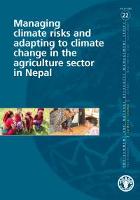Managing climate risks and adapting to climate change in the agriculture sector in Nepal
 Projected future scenarios of climate suggest that climatic conditions in Nepal will worsen, which may imply even more frequent occurrences of climate-related extremes and negative impacts on food production. However, by adopting the right measures, it is possible to manage the climate risks and adapt to the challenges posed by increasing climate variability and climate change. Efforts to promote such measures require a comprehensive approach that includes strengthening the capacities of institutions and delivering needbased services to farming communities. This report provides detailed information about climate and its variability in Nepal, including past trends, future climate change projections and likely impacts on the agriculture sector. The report elaborates the institutional context for managing climate risks and adaptation and reiterates the need to strengthen the collection and analysis of data and information. A comprehensive typology of coping and adaptation strategies for managing current climate risks and building the necessary knowledge and good practices for advancing adaptation over the longer term is presented. The report also examines the issues and opportunities for mainstreaming climate change concerns into broader agriculture and food security policies, plans and strategies.
Projected future scenarios of climate suggest that climatic conditions in Nepal will worsen, which may imply even more frequent occurrences of climate-related extremes and negative impacts on food production. However, by adopting the right measures, it is possible to manage the climate risks and adapt to the challenges posed by increasing climate variability and climate change. Efforts to promote such measures require a comprehensive approach that includes strengthening the capacities of institutions and delivering needbased services to farming communities. This report provides detailed information about climate and its variability in Nepal, including past trends, future climate change projections and likely impacts on the agriculture sector. The report elaborates the institutional context for managing climate risks and adaptation and reiterates the need to strengthen the collection and analysis of data and information. A comprehensive typology of coping and adaptation strategies for managing current climate risks and building the necessary knowledge and good practices for advancing adaptation over the longer term is presented. The report also examines the issues and opportunities for mainstreaming climate change concerns into broader agriculture and food security policies, plans and strategies.
Related Content
- Nepal country climate and development report
- Nepal State of Environment Report: The Monthly Overview, November, 2014
- Bangladesh State of Environment Report: The Monthly Overview, April 2014
- World resources report 2010–2011: decision making in a changing climate
- Climate change adaptation and disaster risk management in agriculture
